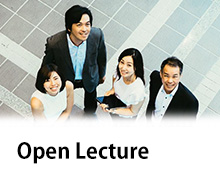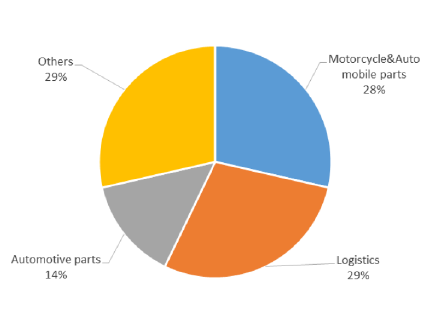
Column & Report
- HOME
- Case Study
- Column & Report
- Intercultural Management Training- 1 day program for Thai business personnel who work in a Japanese Company <Report>
- November 21st, 2017report
- Intercultural Management Training- 1 day program for Thai business personnel who work in a Japanese Company <Report>
We (Cicom Brains UBCL CO., LTD.) held “Intercultural Management Training - 1 day program for Thai business personnel who work in a Japanese company on November 21st, 2017.
What is this program like?
This program is designed for Thai business persons who work in a Japanese company or who work with Japanese. Participants will learn how to communicate more effectively and how to build a good relationship with his/her Japanese bosses, colleagues, and clients etc. Participants will learn how cultural differences affect communication in business and find solutions through a lecture based on “The six dimensions model of national culture (※1)”. This model is one of the best-known cultural frameworks and of the most effective tools to improve cultural awareness and intercultural management skills, defined by Professor Geert Hofstede(※2), as well as various practical exercises and role plays facilitated by a highly experienced professional Cicom Brains UBCL certified instructor. In a program, participants take a self-assessment "Culture Survey (※3)" that allow them to quantify and verify cultural values.
The curriculum is well-structured and organized with the theory of 6-D model, and differentiating from the one in typical training programs which mainly rely on instructor’s talks based on his/her experiences.
By recognizing and respecting cultural differences from the Japanese and utilizing Hofstede’s model, participants will be able to mitigate the risks of misunderstanding of Japanese values and they can understand and fine-tune to Japanese communication style.
The instructor of this program, Prof. Onishi, is an expert who has wealth of knowledge & experience in intercultural management field with numerous lectures and presentations of research, publication of books, etc. He speaks Thai fluently and has completed professional training by Hofstede Insights(※3) as well as extensive experience as an expatriate in various countries in Southeast Asia including Thailand and a 5-year teaching experience at College of Management, Mahidol University (CMMU).
(※1&2) What is Hofstede’s 6-D Model?Professor Geert Hofstede conducted one of the most comprehensive studies of how values in the workplace are influenced by culture. He then defines culture as “the collective programming of the mind distinguishing the members of one group or category of people from others”. The 6-D model is a method based on the result of his extensive worldwide research. This method provides a systematic approach to understand the key underlying factors that influence culture. Prof. Hofstede is a world authority in the field of “Culture and Management”, and his most popular book, Cultures and Organizations: Software of the Mind (1991, newest edition 2010, co-authored with Gert Jan Hofstede and Michael Minkov), has so far been translated into 20 languages. |
(※3)What is “Culture Survey”?"Culture Survey" is an assessment based on the 6-D model. It allows you to objectively understand your own values by the numbers in a range from 0 to 100 represented by 6 dimensions. For example, by comparing each number on values between yourself and the average Japanese, you can foresee potential problems due to differences in values. You can get a useful insights about how to build better relationships in business with staff, business partners, and customers from different countries. |
How was the training?
The participants were quiet and they seemed to be shy at the beginning, the more they got to know each other after several discussion and activities, the more they actively enjoyed group discussions & exercises and shared their experiences & thoughts each other.
In the morning session, the instructor, Prof. Onishi explained difference of cultural values between the Thai and Japanese derived from various factors which influence the national culture, such as geographic, historic, religion, education and language. Prof. Onishi then lectured on “Hofstede 6-D model”.
In the afternoon session, participants took "Culture Survey" assessment and objectively grasp their own sense of cultural values by number. Participants also demonstrated how to greet and how to exchange business cards as examples of some of the most unique behaviors reflecting Japanese cultural values. Through group works and case analysis, participants deepen their understanding of the Japanese values and they will be able to apply 6-D model as a practical skill in their own workplace.

In the case study session, the participants had a group discussion about a practical case, and shared various doubts and challenges they have about Japanese people’s behavior and/or companies’ culture.
For example:
- ・Why do the Japanese people like to hold a lot of meetings?
- ・Why do the Japanese people work hard and stay late in the workplace?
- ・Why are they very well disciplined?
Prof. Onishi provided answers and his opinions based on Hofstede's theory and his research results. He also asked many questions, and let the participants share their opinions if they agree or disagree with the outcomes of discussion with supportive reasons.
Through these activities of inputs and outputs, participants firmly understand the meaning / influence of cultural difference and improve intercultural communication skills and knowledge. Throughout the day, the instructor paid attention to everyone and listened to everyone’s opinions, and participants all were involved in the discussions and answered to the questions from the instructor willingly. And it was very impressive that all participants helped each other during group work and presentation. We hope all participants enjoyed the class and will soon see the better results by utilizing the learned knowledge in their workplace.
The questionnaire results by participants are below. We hope this information will help you to understand how this program was conducted and how useful and effective it is to enhance mutual understanding between Thai and Japanese. We will hold this program next March, 2018. We are looking forward to seeing you in a class.
Instructor Profile
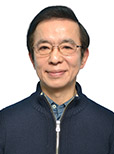
- 大西 純Professor Dr. Jun Onishi
-
After graduating from Ohio University(U.S.A.) and Aoyama Gakuin University(Japan), Mr. Onishi held a Doctor of Philosophy (International Business) from Asian Institute of Technology, a Master of Marketing from Thammasat University, and a Master of Management from Sasin School of Management, Chulalongkorn University, in Thailand.He started his career at Nikon Co., Ltd., a leading film company in Japan; had spent one-third of the year in the Middle East, negotiating with local distributors for 5 years. He moved to Nikon Singapore, then Nikon Hong Kong Limited; totally 5 years. After coming back to Japan, he was responsible for photographic equipment sales in Germany, England, and the Southeast Asia. He moved to Daiwa Securities Co., Ltd., in charge of settlement of stock trading for North American and European institutional customers, then joined Ryobi Ltd., Japan, worked with the staffs in the Middle East, Southeast Asia and in India. After working at Pan Pacific Investment Co., Ltd., as a business consultant for Japanese and Thai firms, he started to build his carrier in an academic/educational area in Thailand; he taught International Business in College of Management, Mahidol University (2001-2006). He is now teaching at Yokohama City University. He provides over 60 thesis, many conference presentations and lectures. He speaks English, Thai, Spanish, and Japanese fluently to deliver training programs. His books;「タイ駐在のためのタイ入門」「Working Japanese in Southeast Asia」etc.
Participant Profile
Participant Satisfaction
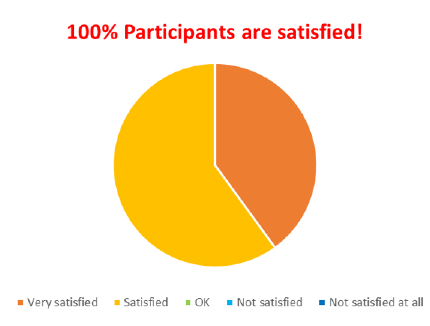
- Q. Why did you participate in this program? (Excerption)
-
- Japanese staff sent me to attend this course.
- I wanted to understand how to work with Japanese people.
- I wanted to understand Japanese culture, their way of thinking. I wanted to share the knowledge which I will learn in this program with my colleagues in order to work cooperatively without conflict.
- I wanted to understand Japanese culture and work with Japanese better.
- Q. What did you get out of this program? (Excerption)
-
- I understood Japanese work behavior, way of thinking, how to work together in the same organization. This will help me improve my work performance.
- I will share this knowledge with my colleagues and staffs in my organization to reduce conflicts between Thai and Japanese.
- I learned how I shall behave and take action in Japanese organization to work with Japanese easier. I could have more deeply and correctly understood Japanese culture and way of thinking by knowing the reason / meaning of Japanese attitude toward Thais than before.
- By knowing Japanese cultural values, I understand Japanese way of thinking.
- I wish I could have more time to do few more activities to exchange opinions with other participants by extending the training time by 1 hour.
Skills required to succeed in a global business environment
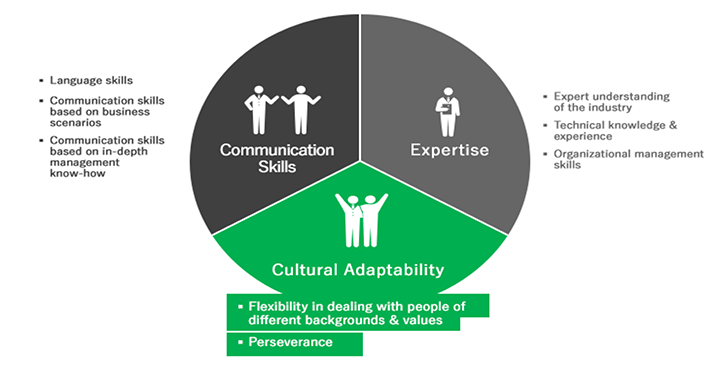
We, Cicom Brains, defines the following three skills as the mandatory abilities for a successful global business personnel.
- ・Communication Skills
- ・Expertise
- ・Cultural Adaptability
And we say cultural adaptability is most crucial to communicate and build a good relationship with boss / colleagues or clients from foreign countries.
If you work in Japanese organization or work with Japanese, you must encounter the difficult situations. One of the reasons is why you have to work with people with different national culture and values. Cultural values have been unconsciously programmed and learned since birth and the behavior you see is only the tip of the iceberg. Understanding this simple fact and learning “Hofstede’s 6-D model” will help you to improve cultural awareness and minimize misunderstandings and stresses caused by cultural gaps. You will then be able to much better perform in an international workplace.
- Contact UsContact us for additional informations about the courses or training plans.
-
Tokyo:+81-(0)3-5294-5576
*Japanese
Bangkok:+66-(0)82-671-8574
*Thai/English
-

